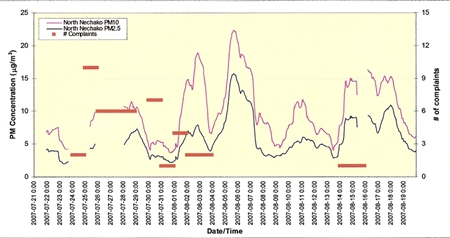Ambient Air Quality Data Coming In
By 250 News

Pink line is PM 10, Blue is PM 2.5 and horizontal red bars are number of complaints from July 21st through to an including August 19th ( graph courtesy Ministry of the Environment)
The Ministry of the Environment has released the latest data gathered from the ambient air monitoring system established to keep track of Pm10 and Pm2.5 in the North Nechako region of Prince George.
The system was set up at the end of June and started collecting data in July.
On some of the days when the 24 hour average of particulates registered high, the number of complaints was low. On days when particulates were not so high, the number of complaints increased.
It would seem, says the Ministry’s A/Section Head for Air Quality, Gabriele Matscha, the complaints are odour driven. While the Ministry staff have tried to collect specific data on the Volatile Organic Compounds and Polycyclic Aromatic Hydrocarbons (both related to odour) during those high complaint episodes, there have been some difficulties. “Either there were problems with the sampler, or the complaints were lodged in the morning, and when we arrived on the scene the odour had dissipated”. As a result, the Ministry has not been able to collect samples of VOC’s or PAH’s. Those particular samples have to be sent to a lab for analysis, and results are not ready for up to three weeks.
If there is good news from this sampling, it is that the levels of PM 2.5 and PM 10 have not exceeded the air quality targets. The Provincial standard for PM10 is 50µg/m3 over a 24 hour averaging period while the Federal Government’s Canada Wide Standard for PM2.5 is 30µg/m3 based on a 24 hour averaging period.
Matscha says so far, area residents have given a positive response to the data collection although some have requested the information be less “technical” in nature. “We are working to improve that for the residents” says Matscha.
This air quality monitoring program is a joint venture funded by several sectors including the industries in the North Nechako Region. Matscha says the monitoring will produce weekly reports through to the fall, the winter data collection will produce monthly reports. She expects the final report will be presented early in 2008.
Previous Story - Next Story
Return to Home








